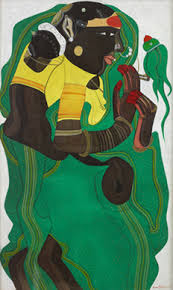"Quiet Desperation"
There is a line from the Pink Floyd lyrics ‘Time’ which goes
like
Hanging on in quiet desperation is
the English way…
 |
| Sunset by Eduardo Calzado |
Ken loach is trying to project this element of dignified
anger through “Looks & Smiles” and he has ended up with something that he
himself did not want to promote. Usually it happens in every filmmaker’s oeuvre
that there would at least be one movie that he/she likes to forget.
Ken Loach started off earnestly that he shot the film in
Black & White. In fact, “Looks & Smiles” is the only B&W cinema
made by the prolific director. Loach wants to avoid any romantic imagery as he
is talking about the miserable present and hopeless future of the English working
class, especially the youth. Alas! Instead of serving hard-hitting visuals, you
are treated with soft and almost lyrical cinematography. Can you complain? Yes,
you must. Take the movies made in the silent era (Charles Chaplin and the like).
The quiet desperation stuff is
portrayed in its creative best.
 |
| An Autumn Afternoon - Eduardo Calzado |
As usual, Ken Loach is training his guns at the political
mandarins of UK. Margaret Thatcher is at the helm and her heavy-handed approach
towards organized labor has stirred considerable resentment. She is privatizing
government services and rolling back the social safety-net that a government is
bound to provide to its citizens. However, one cannot put the blame entirely on
the Iron Lady. Who voted her to power, after all? The citizens themselves. Ken Loach’s
fury gets neutralized at this point quite a lot.
Looks and Smiles (1981) presents a linear story about the
lives of three white working class youths in the industrial city of Sheffield.
They are broke to buy even cinema tickets. What’s more, making a bee-line to
the bus-stop, running as fast as they could and when the bus halts, they can’t
get in.
Looks and Smiles registers frustration rather than
anger.
 |
| Hope -Eduardo Calzado |
Mike Walsh, first among equals among the trio desperately
needs a job with his modest qualifications (just a school-leaver) and turns out
a perennial loser. He meets his girl-friend Karen Lodge in a disco where the
bouncers are at his back for no good reason. Perhaps, his impoverished looks are
to be blamed! Karen is employed as a
clerk in a local shoe-store. Her parents are separated and both have their own
partners to live with. Karen is fed up with her mother’s boy-friend as he
dictates terms. At last, Karen takes the long way with Mick to meet her father
who is a long-distance lorry-driver and stays afar. He shares a tiny one-room apartment with a
woman who already bore a kid to him. The doors are being shut one by one. Meanwhile, the last of the trio, Alan
Wright joins the Army, as he didn’t have a choice. The general feeling is that it is better to
go starving rather than getting packed up to Ireland and start shooting the
young freedom-fighters.
Mick, Karen and Alan are good, well-intentioned white folk
though the boys have shades of criminality in them. Mick steals a car and
breaks into a bar late night to get some cash. At the same time, he still
believes in the work ethic and follows most of society’s basic rules.
In short, the youth are all trying to reconstruct their lives
but they can’t. The closing shot shows the blank face of the protagonist, which
is not a solace for the viewer.
One wonders, where have the smiles gone !
*************

No comments:
Post a Comment
Post a Comment